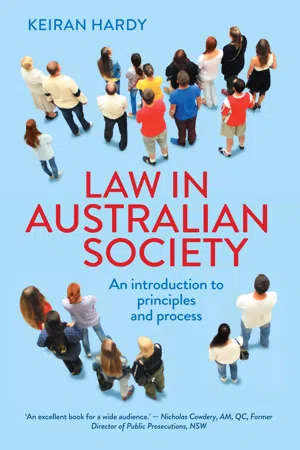
Law in Australian Society
An introduction to principles and process
- 304 pages
- English
- ePUB (mobile friendly)
- Available on iOS & Android
About this book
What is 'the rule of law'? How do laws get made? Does our legal and political system achieve justice for all Australians equally?Designed for beginners as well as non-law students this text provides a comprehensive and accessible guide to understanding Australia's system of law and government. Dr Keiran Hardy describes how legislation is made, the nature of case law, the hierarchy of courts and the doctrine of precedent. He looks at the role played by politics and the media in shaping law, and he describes founding principles including democracy, liberalism, the separation of powers and federalism. The criminal justice system is explained including criminal offences, police powers, sentencing and punishment, and there is a special emphasis on Indigenous peoples and the law. The book concludes with case studies of cybercrime and counterterrorism legislation to illustrate law reform in action. Each chapter features practical examples, chapter summaries and review questions together with a glossary of key terms.Concise, accessible and up-to-the-minute, this is a vital guide for anyone seeking to understand the complexity of Australian law and government.'This is an excellent book for a wide audience... equally useful for law students, legal studies students in high school and anyone seeking an understanding of how and why the law is as it is. And how things might be improved.' - Nicholas Cowdery, AM, QC, former Director of Public Prosecutions, NSW 'A wonderful text... The overall structure and the inclusion of comprehension questions, glossaries and a curated reference list ensure that students can build on their understanding over the course of the book.' - Jackie Charles, Rule of Law Institute of Australia
'This introduction to Australian law is comprehensive, contemporary and accessible. It is a perfect primer for new students requiring a broad understanding of Australia's legal system. From cybercrime to the workings of Australia's parliament, this book has it all.' - George Williams, AO, Dean, Anthony Mason Professor, Scientia Professor, University of New South Wales
' Law in Australian Society' is an ideal text for first year students in criminology, legal studies, policing and related fields. Its easy-to-read format aids students in understanding the complexities and subtleties of the Australian legal system.' - Emma Colvin, Centre for Law and Justice, Charles Sturt University
Frequently asked questions
- Essential is ideal for learners and professionals who enjoy exploring a wide range of subjects. Access the Essential Library with 800,000+ trusted titles and best-sellers across business, personal growth, and the humanities. Includes unlimited reading time and Standard Read Aloud voice.
- Complete: Perfect for advanced learners and researchers needing full, unrestricted access. Unlock 1.4M+ books across hundreds of subjects, including academic and specialized titles. The Complete Plan also includes advanced features like Premium Read Aloud and Research Assistant.
Please note we cannot support devices running on iOS 13 and Android 7 or earlier. Learn more about using the app.
Information
Part 1
Law, Politics and the Media
Introduction



I. WHAT DOES LAW DO?
II. WHAT IS LAW?
III. WHY IS LAW IMPORTANT?
Table of contents
- Cover
- About the author
- Title Page
- Copyright Page
- Contents
- Detailed Contents
- List of figures
- Preface
- Part 1: Law, Politics and the Media
- Part 2: Rights, Theories and History
- Part 3: Criminal Justice
- Part 4: Case Studies
- Acknowledgements
- References
- Glossary
- Index